NASCAR Hall of Fame’s legacy – Red Byron’s Ford #22
For many, the number 22 may represent a deficient number or a pentagonal number. For NASCAR fans it represents Red Byron's number.
There are no shortages when it comes to looking for road trips between automotive museums. Using the map feature on automotivemuseumguide.com makes this extra easy. However, sometimes you just need a little extra motivation, so here’s a trip you can plan in the south that’ll take you to 6 automotive museums in a round trip in under 500 miles.
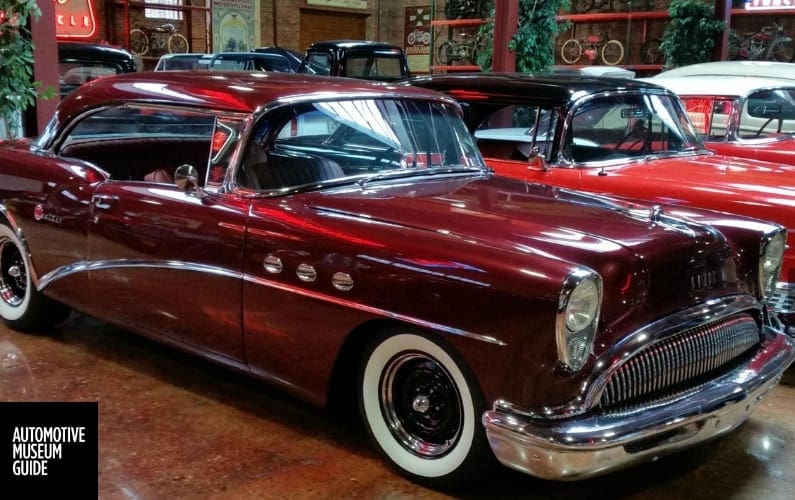
Where you start is up to you, but for the purpose of this article, we are going to start in Chattanooga, TN with the Coker Museum at Honest Charley. You may be familiar with Coker tires, but if you’ve never been to this downtown museum you’re missing out. The building itself is even a destination.

Next up we head over to the Hollywood Star Car Museum in Gatlinburg, TN. (153 miles) This museum is nothing like the previous museum, but if you enjoy seeing cars from the movies, you’ll love it here. Gatlinburg is also a bit of a tourist destination so you may also want to walk around the town to see what else the town has to offer.
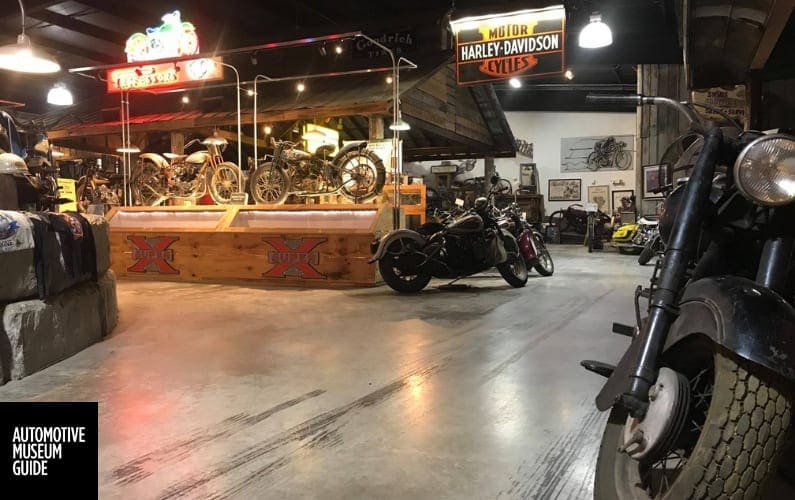
The next museum is only 50 miles away and again is completely different from the first two museums. Dale’s Wheels Through Time is a motorcycle museum. There are a couple of cars in the museum, but it is definitely an American motorcycle museum and it is packed with them. This museum was originally started by Dale Walksler who you’d often times see starting and riding motorcycles in and around the museum. Dale has since passed, but his son Matt has followed in his dad’s footsteps and keeps he keeps his father’s spirit alive in the museum.
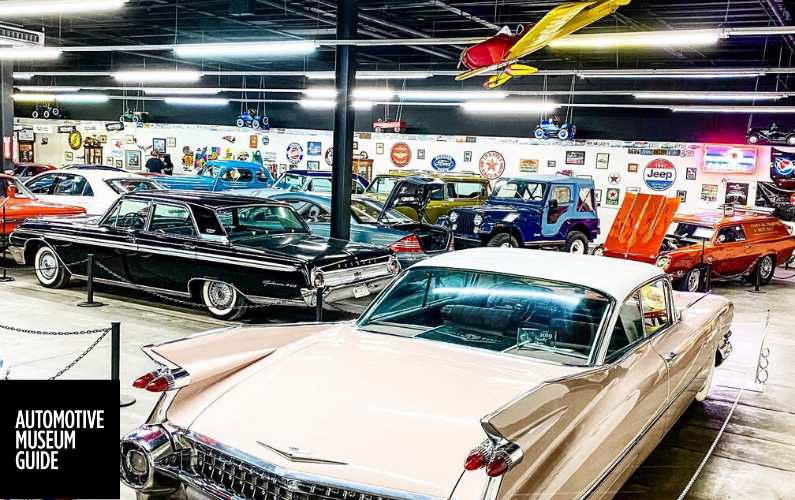
A nice 92-mile drive south through the Smokey Mountains will take you to Miles Through Time Automotive Museum, not to be confused with Dale’s Wheels Through Time or Wheels O’ Time. This museum is located only 20 minutes south of Helen, GA, which is the 3rd most visited city in Georgia. You’ll see over 90 full-size vehicles and over 5,000 model cars, plus there is an entire replica town, including the original Phillips 66 filling station. Miles Through Time is located inside an antique store called Vintage Garage Antiques which is also located inside an old textile mill.
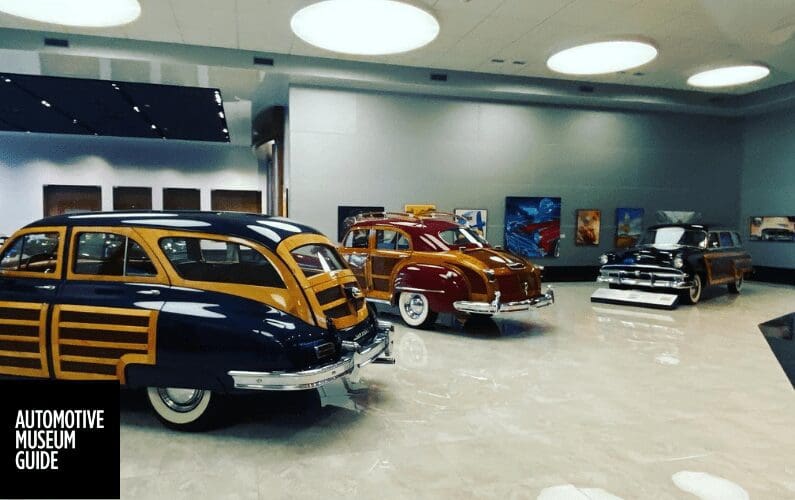
After you get your fill at MTT you’ve got a 117-mile drive west to the Savoy Automobile Museum in Cartersville, GA. Savoy stands alone from all the other museums on this trip as being the most fancy. The building and grounds are new and beautiful in this contemporary automotive art museum. There are multiple galleries that change monthly so there is always something new to see. There are many other museums to visit in Cartersville, including the Tellus Science Museum which also has a small collection of vehicles on display.
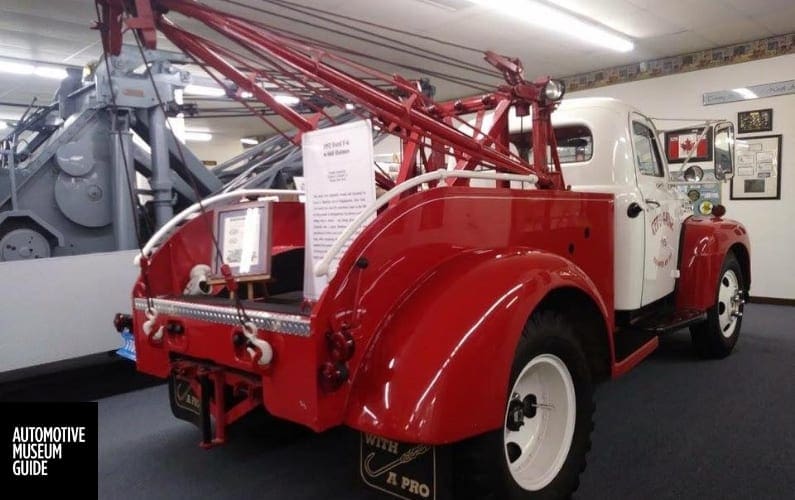
From Savoy, it’s a 74-mile trip back up to Chattanooga where you can visit the International Towing and Recover Museum. Not into tow trucks? Don’t let the name fool you, this is a super cool museum and after visiting you are going to be into tow trucks.
Total miles: 488
Total museums: 6+
.
For many, the number 22 may represent a deficient number or a pentagonal number. For NASCAR fans it represents Red Byron's number.
These are 6 automotive museums you can visit in the south within a 500-mile loop and they are awesome.
automotive museum guide
Sign up to get updates about automotive museums right to your mailbox. Don't miss a thing. It's FREE.
For many, the number 22 may represent a deficient number or a pentagonal number. For others, it may symbolize chaos and disorder. But for NASCAR fans, the number 22 holds importance because it was Red Byron’s number, a World War II hero, and the first champion of the NASCAR Strictly Stock Division.
Let’s take a sneak peek into the life of Red Byron, the man behind the blisteringly fast number 22 on NASCAR tracks.
Robert Nold Byron, commonly known as the Red Byron, was one of the best drivers in the late 1940s. He didn’t really start off as a stock car racing driver, but was a dirt track racer, racing around the Anniston and Talladega areas.
His passion for racing would come to a halt as war loomed around the corner. At the age of 26, he became an engineer on the early B-24 Liberators, American heavy bomber aircraft, in the Second World War. Byron was a mechanical genius, and he was responsible for fixing anything that went wrong on the B-24.
An unfortunate incident occurred during a mission over the Aleutian Islands where an explosion in the aircraft nearly cost Robert his leg. His left leg was severely shredded with shrapnel from the bomb explosion near the fuselage. You could say it was the destiny of a man born during the First World War.
The doctors managed to save his leg from amputation, but it never got any better than that. Byron spiraled into depression after spending 27 months in a military hospital and not fully recovering from his leg. His family suggested that he get back into racing as a way to rediscover happiness, and he did.
Byron was discharged from the hospital with his left leg in a steel brace and a will to conquer the race tracks. He drove around the United States in a Ford with a hand-operated clutch that he had designed.
Byron was too fast, and in 1946, he entered a stock car race at the Seminole Speedway. His team designed a clutch pedal that could easily attach to his left leg, and to everyone’s surprise, Byron beat Roy Hall, a pioneering American stock car racing driver, and Bill France, a NASCAR promoter and racer. The Seminole Speedway victory cemented Byron’s ambition to become a legend in the stock racing car world.
Byron participated in the NASCAR Modified Series in 1948 and won the championship with a tricked-out 1939 Ford. Little did Byron know that he was about to make history a year later. In 1949, NASCAR announced the Strictly Stock Division, nowadays popularly known as the Sprint Cup Series.
Throughout his life, after the hospital discharge, Byron was constantly popping aspirin to subdue the pain, but it was the adrenaline from racing that truly pushed him forward to new heights. Byron went on to win two of the eight races, securing a score of 842.5 points and becoming the first champion of the Strictly Stock Divisions, a record that can never be broken.
After winning the Strictly Stock Division title, Byron scaled back his racing activities due to his declining health and never truly achieved anything as great as the 1949 victory. However, he remained involved in racing, secretly tinkering around in a garage to put together an American car that would be able to win the notorious 24 Hours of Le Mans.
Unfortunately, he had a heart attack at 45 in 1960 and died at a hotel in Chicago where he was supposed to speak with Anheuser-Busch about starting his own sports car team.
Over his brief racing career, Byron accumulated several wins and titles to his name. However, his achievements came after his death when, in 1966, Byron was selected to the National Motorsports Hall of Fame and, in 1998, he was named one of NASCAR’s top 50 greatest drivers.
In 2018, Red Byron made it into the NASCAR Hall of Fame, and his legendary black No. 22 Ford is just inside the main entrance (located in Charlotte, North Carolina.) If you glance inside the Ford, you’ll see his left leg’s bracket bolted to the clutch.
Today, many may have forgotten Byron, but it is our responsibility to recognize the man who left racing behind to serve his country and then chose racing over pain. Byron achieved more in his brief history than any other NASCAR champion. He won the first-ever NASCAR championship, which will forever be instilled in the minds of motorsports enthusiasts around the world.
Here is the information if you want to visit the NASCAR Hall of Fame Museum:
400 E M.L.K. Jr Blvd
Charlotte, NC 28202
P: 704-654-4400
Admission: $25, 3-7 $12 8-12 $18
Combo packages available from $34 to $39
Plan: 1-2hr
Open: WINTER HRS Oct 27 – Mar 31 Daily 10am – 5pm, No General Admission on Tuesdays
Image via Trent Cherry
.
For many, the number 22 may represent a deficient number or a pentagonal number. For NASCAR fans it represents Red Byron's number.
These are 6 automotive museums you can visit in the south within a 500-mile loop and they are awesome.
automotive museum guide
Sign up to get updates about automotive museums right to your mailbox. Don't miss a thing. It's FREE.